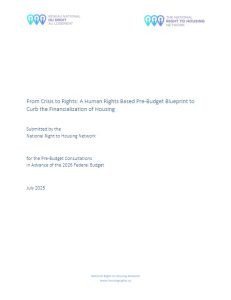From Crisis to Rights: A Human Rights Based Pre-Budget Blueprint to Curb the Financialization of Housing
Background
Housing is a human right in Canada, yet over 235,000 people across the country experience homelessness every year, with countless more facing constant threats of eviction, renoviction, unaffordability, and systemic discrimination.
In Canada, a major driver of this housing and homelessness crisis is the financialization of housing—when housing is treated as a profit-driven investment by entities like REITs, hedge funds, and private equity firms, rather than as a place to live.
This treatment of housing as a financial asset instead of a fundamental human right is depleting Canada’s affordable housing stock. Between 2016 and 2021, Canada lost 230,000 affordable rental units; in the city of Ottawa, for every affordable unit built, seven were lost. This rapid loss of affordable housing is disproportionately harming racialized communities, people with disabilities, Indigenous peoples, and other marginalized groups.
In 2019, the federal government passed the 2019 National Housing Strategy Act—which affirms housing as a human right in Canada—yet the lack of strong government regulation on institutional investors continues to undermine the right to housing for all.
Our 2025 Pre-Budget Submission:
While the federal government’s Budget 2024 included key initiatives—such as a Renters’ Bill of Rights and major housing funds—critical gaps remain. Without stronger government intervention and regulation, the financialization of housing will continue to deepen Canada’s housing and homelessness crisis.
In the National Right to Housing Network’s 2025 pre-budget submission—From Crisis to Rights: A Human Rights Based Pre-Budget Blueprint to Curb the Financialization of Housing—we provide 11 recommendations on how the federal government can address the financialization of housing and strengthen the right to adequate housing for all.
Recommendation snapshot:
- Update the National Housing Strategy with programs and policies that genuinely make housing more affordable. This includes establishing concrete goals and timelines (like Canada’s carbon goals to cut emissions by 50% by 2035) with a particular focus on improving housing outcomes for persons in greatest need;
- Announce a plan to understand what’s really happening for tenants through better data collection and dissemination;
- Increase investment in the Tenant Protection Fund to $30 million over 5 years, and launch a second call for proposals;
- Commit to doubling Canada’s community housing stock by 2034, accelerating investment in social/public, cooperative, non-profit housing and community land trusts;
- Align housing investment with human-rights principles by introducing fiscal and regulatory incentives;
- Outline a plan for national rent and vacancy control, including a plan to evaluate and implement a rent regulation strategy;
- Outline a federal plan to restrict no-fault evictions—including renovictions—particularly by corporate and financialized landlords;
- Meet and exceed accepted standards on accessibility by amending the federal building code and incentivize provincial, territorial, and other jurisdictions to similarly amend their building codes;
- Announce a strategy to regulate landlords against using Artificial Intelligence Software to increase rents;
- Require a single, rights-based definition of “affordable housing” for all federally funded housing programs;
- Improve Canada’s social assistance programs by considering the recommendations of Maytree.


